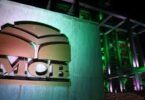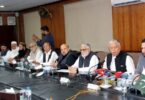F.P. Report
LAHORE: President All Pakistan Business Forum (APBF) Syed Maaz Mahmood has said that constant increase in inflation will be the most serious threat to the economy in the new fiscal year as the consumer prices influenced by faster rupee depreciation and rise in energy prices have increased to their highest level in five years.
In a statement issued here on Monday, Syed Maaz Mahmood lamented that constant increase in oil, gas and power rates had hit the Inflation, also threatening to rupee stability. Moreover, the government approaching of the International Monetary Fund for financial assistance once again would also bring a fresh wave of price-hike. He said the people would not benefit from the IMF loan as the lavish spending has been continuing in this government too.
He said that after hike in fuel prices, the National Electronic Power Regulatory Authority (NEPRA) approved a hike of 81 paisa per unit on the price of electricity last month, leading to the consumers having to bear an additional financial burden.
The APBF President said that electricity users are facing further hike in power prices as the government is planning to increase electricity rates by Rs3.26 per unit in coming months in order to meet revenue requirements of power distribution companies. The government has already increased electricity tariff by 33 percent or Rs1.20 per unit after coming into power, he added.
He said that inflation measured through consumer price index (CPI) surged to 9.4 percent last month. Over the past three months, prices of fresh vegetables, fruits and meat have posted persistent increase while average inflation during the July-March period rose by 6.79 percent on a yearly basis.
The most dominating push to inflation came from non-food-non-energy (core inflation) component that typically represents the underlying demand pressures on the economy. The core inflation, measured by excluding volatile food and energy prices, was recorded at 8.5 percent year-on-year. It has been steadily rising for a couple of months despite tightening of the monetary policy.
“The IMF loan would have devastating effects on economy, as with more taxes, increased rates of utilities and cost of production would further increase. This will render the Pakistani exports non-competitive in the globalised competitive environment,” he feared.
Syed Maaz Mahmood argued that policies dictated by the IMF were not always suitable for the situation of the country. He argued that there were several examples of how the IMF failed to understand the dynamics of the country that they were dealing with. He said that with a view to bridge financing gap, there were different medium-term solutions to fill up the gap as the government would have to generate non-debt inflows such as foreign investment and remittances or cut down trade deficit by boosting exports and reducing imports.
He said no IMF bailout package had ever been successful since 1988 due to lack of fiscal management and any solid structure for repayment.
The APBF president said the fast rising up graph of inflation and law and order situation in parts of the country had put the industrial sector in deep troubles therefore the government would have to come up with out-of-the-box solution to expedite economic activities in the country.






